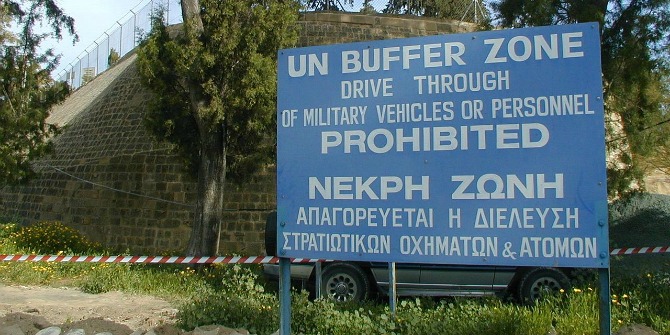This edited volume presents a range of perspectives on the Cyprus conflict, with thirty leading experts drawing on their research and experience to assess whether a solution can finally be found to the dispute. Nikos Christofis finds the book to be a welcome addition to the literature on the Cyprus Problem which brings together some of the most important arguments pertaining to the issue in a single volume.

Starting in the 1960s, when the conflict between the two communities in Cyprus erupted and escalated, numerous UN-led attempts at mediation were carried out with the aim of defusing the situation and finding a solution. In 1974 the Cyprus Problem took on an entirely new dimension with the Turkish invasion as each side emphasised the losses they suffered and tried to legitimise their claims. In the early 2000s there was increased optimism that a solution would be found largely because of the EU accession talks held in 2004. Those talks led to the UN-sponsored Annan Plan which presented an opportunity for the two communities to construct a viable basis for resolving the issue.
The Greek Cypriot community rejected the plan after it had been put to a referendum, and this, together with other issues concerning Turkey’s accession talks, led to a relative stalemate in the negotiations between the two communities. This state of affairs complicated matters even more for the Mediterranean island and it seemed unlikely that a solution would be found. In recent years, however, negotiations were revived. In this context, Resolving Cyprus: New Approaches to Conflict Resolution, which was edited by James Ker-Lindsay, is an impressive and timely contribution to the existing literature.
James Ker-Lindsay, as a leading authority on the Cyprus Problem who has followed developments in the country for decades and seen the failures of the attempts made so far to solve the issue, initiated this project with a focus on core questions such as whether the Cyprus Problem can actually be solved, what has made the Cyprus Problem so difficult to resolve, and whether the main issue at hand is the end goals that are being pursued (p. 2).
 Image credit: UN Buffer Zone – Green Line, Cyprus by Jpatokal (Wikimedia CC BY-SA)
Image credit: UN Buffer Zone – Green Line, Cyprus by Jpatokal (Wikimedia CC BY-SA)
Thirty leading experts on the issue were asked to discuss their thoughts within the scope of their research interests and identify the factors or particular aspects of the Cyprus Problem that need to be comprehensively addressed so that concrete results can be achieved. They were also asked to identify those parties which have blocked efforts to find a solution. The essays do not hold to a strict academic format burdened with extensive references, but rather they take the form of essays that cover almost all aspects of the Cyprus Problem, including personal experiences. This is one of the reasons the book does not adhere to a particular thematic structure, and this is a reflection of a deliberate choice made by the editor to allow for a multitude of perspectives as well as overlap between the chapters in the book.
Some of the essays treat the Cyprus Problem through a historical lens (Ahmet An, Jan Asmussen, Husam Mohamad, Robert Holland), while others, such as the entries by Klearchos A. Kyriakides and Nikos Skoutaris, approach the issue through the perspective of law. Robert McDonald weighs into the discussion from the standpoint of security, Giorgos Charalambous and George Kyris focus on party politics, and numerous other essays emphasise the settlement process in terms of both external and internal factors.
The chapters by Birte Vogel and Oliver Richmond, Erol Kaymak, James Ker-Lindsay, Paschalis Kitromilides, Ahmet Sözen, and Mustafa Ergün Olgun focus on the issue of a bizonal, bicommunal federation (BBF). The recent discovery of gas reserves has sparked new interest in the issue, as demonstrated by the essays by Hubert Faustmann and Ayla Gürel and Harris Tzimitras, and these authors point out that the gas reserves have been perceived as a potential catalyst for peace. Another essay deals with civil society (Yeshim Harris), and Maria Hadjipavlou takes up the issue in terms of gender, one of the least analyzed aspects of the Cyprus Problem.
Although the contributions employ different approaches, they all stress the importance of finding a solution and the benefits that would be brought to the people of the island through accession to the EU as a whole. In addition, the chapters point out that the entire region would benefit from stability on Cyprus. However, there is a considerable amount of skepticism and pessimism among many of the contributors and some of the essays state outright that there is still much work to be done and that it remains debatable whether or not a commonly accepted agreement can be reached, as it constitutes “another minefield [concerning] what is a just solution” (p. 117).
There were some typographical errors as regards names (p. 185, p. 199, p. 244, p. 275) and in some cases the same name was written differently (i.e. Clement Dodd on p. 192 and C. H. Dodd on p. 218). In the book the main issue at hand was referred to in numerous ways (in some cases even within the same essay); in some places it was called the Cyprus Problem, in others the Cyprus Dispute, and still others the Cyprus Question, and this could prove frustrating for readers unfamiliar with the developments that have occurred in Cyprus over the years.
Nonetheless, Resolving Cyprus is an impressive compilation of essays and its publication could not be more timely as it coincides with the landslide victory of Mustafa Akinci as the new Turkish Cypriot leader. His Cypro-centric, anti-status quo, and pro-solution agenda has brought about a climate of euphoria in both communities and created a positive atmosphere for the new round of negotiation talks that started in May of 2015.
This book is a welcome addition to the literature on the Cyprus Problem mainly because it brings together some of the most important arguments pertaining to the issue, and it brings together an array of essays that touch on almost every aspect of the developments that have occurred on the island. As such it will be an indispensable volume for those interested in the Cyprus Problem. All parties that are directly involved in the settlement process would greatly benefit from consulting the book as it takes up all the stereotypes that have impacted the settlement process and the issues that have thus far blocked efforts to find a solution to the Cyprus Problem.
Nikos Christofis received his PhD from Leiden Institute for Area Studies (LIAS), Leiden University in 2015. His dissertation has the title From Socialism via Anti-Imperialism to Nationalism. EDA – TİP: Socialist Contest over Cyprus. He edited, revised and annotated a Turkish grammar (in Greek), and published articles in books and journals. He is also one of the reviewers and members of the editorial board of the e-journal Athens Journal of History and the Politikon: IAPSS Political Science Journal, as the chief-editor of Ottoman and Turkish Studies, Dissertation Reviews.






